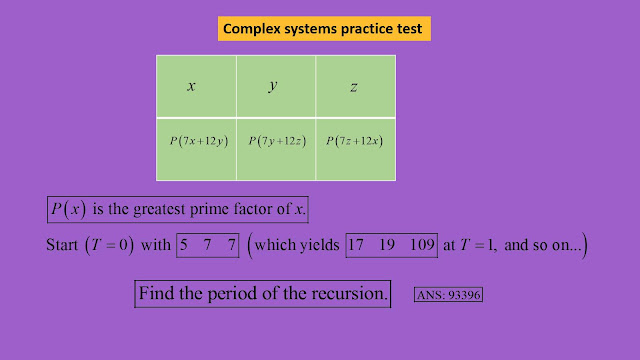My first post-pandemic faculty-student paper and the 14-th overall (written with Rachael Harbaugh, ONU '23, a talented Mathematics Education major). Glad for this "restart". Students need confidence, need to be exposed to interesting math topics, and then we hope for the best in their future timelines.
Friday, December 16, 2022
Friday, December 9, 2022
Senior Capstone Colloquium - Fall 2022
Mathematics Capstone Colloquium - December 7, 2022 @ohionorthern (from L to R: Dr. Chowdhury, Joelena Brown, Rachael Harbaugh, and Dr. Caragiu)
Joelena Brown: "Rectangular Donut Numbers" (advisor Dr. Chowdhury)
Rachael Harbaugh: "Extending a Putnam Problem to Fields of Various Characteristics" (advisor Dr. Caragiu)
Monday, November 7, 2022
Thursday, November 3, 2022
Wednesday, June 29, 2022
Monday, June 20, 2022
The random Fibonacci sequence and the Viswanath's constant
Random Fibonacci recursion
https://en.wikipedia.org/wiki/Random_Fibonacci_sequence
In mathematics, the random Fibonacci sequence is a stochastic analogue of the Fibonacci sequence defined by the recurrence relation, where the signs + or − are chosen at random with equal probability
, independently for different
. By a theorem of Harry Kesten and Hillel Furstenberg, random recurrent sequences of this kind grow at a certain exponential rate, but it is difficult to compute the rate explicitly. In 1999, Divakar Viswanath showed that the growth rate of the random Fibonacci sequence is equal to 1.1319882487943...(sequence A078416 in the OEIS), a mathematical constant that was later named Viswanath's constant.
Tuesday, May 31, 2022
Saturday, May 21, 2022
Friday, April 22, 2022
Sunday, March 27, 2022
Wednesday, March 23, 2022
Friday, March 18, 2022
A nice application of Calculus 2
Via @10kdiver
Take 2 random numbers X and Y between 0 and 1. What's the probability that the integer nearest to X/Y is even?
Prove that said probability is (5-Pi)/4.
Monday, February 28, 2022
Experimental math fantasy 1
In my classes I often try to communicate the specific sense of wonder arising from mathematical experimentation, to the benefit of undergraduates. Here "phi" represents the Euler's totient function, in a serendipitous trigonometric (albeit nonlinear) mix.
Saturday, February 26, 2022
Friday, February 25, 2022
What is chaos? A complex systems scientist explains

Chaos evokes images of the dinosaurs running wild in Jurassic Park, or my friend’s toddler ravaging the living room.
In a chaotic world, you never know what to expect. Stuff is happening all the time, driven by any kind of random impulse.
But chaos has a deeper meaning in connection to physics and climate science, related to how certain systems – like the weather or the behavior of a toddler – are fundamentally unpredictable.
Scientists define chaos as the amplified effects of tiny changes in the present moment that lead to long-term unpredictability. Picture two almost identical storylines. In one version, two people bump into each other in a train station; but in the other, the train arrives 10 seconds earlier and the meeting never happens. From then on, the two plot lines might be totally different.

Usually those little details don’t matter, but sometimes tiny differences have consequences that keep compounding. And that compounding is what leads to chaos.
A shocking series of discoveries in the 1960s and ‘70s showed just how easy it is to create chaos. Nothing could be more predictable than the swinging pendulum of a grandfather clock. But if you separate a pendulum halfway down by adding another axle, the swinging becomes wildly unpredictable.
Chaos is different from random
As a complex systems scientist, I think a lot about what is random.
What’s the difference between a pack of cards and the weather?
You can’t predict your next poker hand – if you could, they’d throw you out of the casino – whereas you can probably guess tomorrow’s weather. But what about the weather two weeks from now? Or a year from now?
Randomness, like cards or dice, is unpredictable because we just don’t have the right information. Chaos is somewhere between random and predictable. A hallmark of chaotic systems is predictability in the short term that breaks down quickly over time, as in river rapids or ecosystems.

Why chaos theory matters
Isaac Newton envisioned physics as a set of rules governing a clockwork universe – rules that, once set in motion, would lead to a predetermined outcome. But chaos theory proves that even the strictest rules and nearly perfect information can lead to unpredictable outcomes.
This realization has practical applications for deciding what kinds of things are predictable at all. Chaos is why no weather app can tell you the weather two weeks from now – it’s just impossible to know.
On the other hand, broader predictions can still be possible. We can’t forecast the weather a year from now, but we still know what the weather is like this time of year. That’s how climate can be predictable even when the weather isn’t. Theories of chaos and randomness help scientists sort out which kinds of predictions make sense and which don’t.
Read other short accessible explanations of newsworthy subjects written by academics in their areas of expertise for The Conversation U.S. here.
Mitchell Newberry, Assistant Professor of Complex Systems, University of Michigan
This article is republished from The Conversation under a Creative Commons license. Read the original article.











